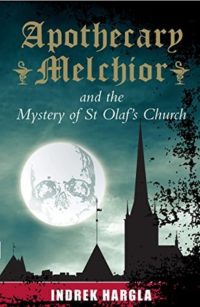A monk’s thoughts must be like a town defended by a sturdy wall
 Apothecary Melchior and the Mystery of St Olaf’s Church
Apothecary Melchior and the Mystery of St Olaf’s Church
by Indrek Hargla
translated from Estonian by Adam Cullen
This is my fourth book completed for the EU Reading Challenge, and the first one that came from a recommendation I received after my initial blog post. So thank you to Kätlin (who is Estonian but lives in the UK) for suggesting this book. I’ve learned a little about the history of Tallinn and enjoyed a satisfying murder mystery to boot.
The setting is 1409 Tallinn, which at the time was not strictly part of Estonia, but a recent addition to the Holy Roman Empire. A preface sets the scene: Tallinn is a small coastal town finally enjoying growth and prosperity after a terrible band of pirates have been caught and punished. Christianity is central to everything. As well as having multiple churches of its own, a new castle on the hill overlooking Tallinn houses monks and holy knights.
It is in this castle, Toompea, that the story opens, with a drunken knight stumbling towards his gruesome murder (I should add that only the barest of details are given – this is not a grossout/medically-detailed crime novel). When the body is discovered, Tallinn’s town magistrate, Dorn, is called upon to catch the murderer quickly. He in turn asks his friend, the town apothecary, to help him investigate.
“Wentzel Dorn…in his mind was running through all the positions he would much rather hold than the cursed and detestable office of magistrate, or vogt. The first that came to mind was the honourable occupation of brewer, for two reasons: first, a brewer always has fresh beer close by; and, second, a brewer is never hounded out of bed early in the morning nor ordered to appear urgently at the Town Hall.”
And so we meet the Melchior of the title. He’s 30 years old, fairly recently married, and has spent most of his life in Tallinn, having taking over the apothecary shop from his father. As an apothecary, he is one of the best-educated men in the city. He notices small details in people’s behaviour and has a knack for using roundabout conversation to find out what he wants to know. He’s also trusted by everyone.
Melchior demonstrates many of the classic detective tropes. He infuriates those around him by never explaining his methods, or that he’s discovered a clue; he talks up his solution in long-winded fashion; he’s a lone wolf despite officially being the assistant. So this book will appeal if you’re a fan of the Poirot school of murder mystery, but the solution doesn’t come out of nowhere – all the clues are supplied along the way.
“Since every apothecary needed to appear slightly mysterious and display his countenance to the townspeople, Melchior had hung a small stuffed crocodile from the ceiling above his table. It had cost ten marks and, as the sly merchant assured me, was supposed to be a genuine Egyptian crocodile. Whether true or not, the townspeople seemed to believe it was.”
It’s a story about pirates, monks, knights, murder, religion and superstition, with a handful of romantic subplots. Which sounds exciting – more exciting than it turned out to be. Don’t get me wrong, I did enjoy this book. But the historical setting means that religion is central to how everyone speaks, which can get tedious. And all the detective work involves long conversations, which can make it slow-moving. Even educated characters are still soaked in superstition.
We meet the leading players one at a time in the early chapters, before the entire narrative becomes Melchior’s investigation. They’re an interesting collection and they are all potentially guilty, though of course I had my favourites who I hoped wouldn’t turn out to be guilty.
“Prayer is an art. Genuine prayer, a beseeching force bursting from within a person that makes its way up to God, this must be learned and learned diligently. Prior Eckell had learned to pray before falling asleep in a way that his prayers remained with him for the entire night, sustained throughout his dreams…they spiralled around his thoughts, and he even heard himself speaking with the angels and saints…A monk’s thoughts must be like a town defended by a sturdy wall, but sleep is a time when the town gates are opened wide and the watchmen have vanished with the keys.”
This is the first in a series about Apothecary Melchior, so perhaps in future volumes his mysterious illness (what appears to be depression and night terrors) will be elucidated. And maybe his wife Katerlyn will get to have an actual character of her own. Maybe he’ll get to buy that town house he has his eye on. So many questions still to be answered.
Apteeker Melchior ja Oleviste Moistatus published 2010 by Varrak.
This translation published 2015 by Peter Owen.
Source: Amazon.